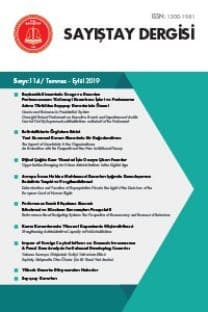SOSYAL GÜVENLİK KATKI PAYLARININ İŞSİZLİK ÜZERİNDEKİ ETKİSİ
Sosyal güvenlik katkı payları, İşsizlik, Sosyal güvenlik vergileri, İşgücü piyasası
THE EFFECTS OF SOCIAL SECURITY CONRIBUTIONS ON UNEMPLOYMENT
Social security contributions, Unemployment, Payroll taxes, Labour market,
___
- Álvarez-Martínez, M.T. , C. Polo (2014), “Reduce Employers’ Social Security Contributions and Control Labor Fraud: Remedies for Spain’s Ailing Economy?”, Economic Systems Research, 26(2): 141-154.
- Arandarenko, M., Vukojevic, V. (2008), Labor Costs and Labor Taxes in the Western Balkans, in C. Bredenkamp, M. Gragnolati and V. Ramljak (Eds.), Enhancing Efficiency and Equity: Challenges and Reform Opportunities Facing Health and Pension Systems in the Western Balkans, Washington, DC: The World Bank.
- Balcı İzgi, B. (2007), “Sosyal Güvenlik Sisteminin Özel Tasarruflar Üzerindeki Etkisi: Türkiye Örneği”, Ç.Ü. Sosyal Bilimler Enstitüsü Dergisi, 16(1): 361- 374.
- Blum, U.C.H., M. J. I. Gaudry (1990), “The Impact of Social Security Contributions on Savings, An Analysis of German Households by Category”, Jahrbuch für Sozialwissenschaft, 41(2): 217-242.
- Boeri, T., Börsch-Supan, A., Tabellini, G. (2001, Would you Like to Shrink the Welfare State? A Survey of European Citizens, Economic Policy, 16(32): 7-50.
- Campoy-Muñoz, P., M. A. Cardenete, M. C. Delgado, G. J .D. Hewings (2016), Effects of a Reduction in Employers’ Social Security Contributions: Evidence from Spain, REAL 16-T-1.
- Coenen G, P. McAdam, R. Straub (2008), Tax Reform and Labour-Market Performance in the Euro Area, A Simulation-Based Analysis Using the New Area-Wide Model, Journal of Economic Dynamics and Control, 32(8): 2543-2583.
- Demir, M., T. Canbay (2013), “Türkiye’de Sosyal Güvenlik Açıklarının Azaltılmasında Denetimin Önemi (Manisa İli Örneği)”, Sosyal Bilimler Dergisi, 11(3): 451-467.
- Dewatripont, C., S. Erlich, V. Ginsburgh , D. V. Regemonter (1991), “The Effects on Unemployment of Reducing Social Security Contributions: A General Equilibrium Analysis for Belgium”, De Economist, 139(2): 272-290.
- European Commission (2016), Taxation Trends in the European Union, Luxemburg.
- Goerke, L. (1999), “Value-added Tax Versus Social Security Contributions/ Mehrwertsteuer oder Sozialversicherungsabgaben”, Jahrbücher für Nationalökonomie und Statistik / Journal of Economics and Statistics, 219(3/4): 308-325, September.
- Goudswaard, K. , K. Caminada (2015), “Social Security Contributions: Economic and Public Finance Considerations”, International Social Security Review, 68(4): 25-46.
- Güzel, A., A. Okur (2004), Sosyal Güvenlik Hukuku, İstanbul, Beta Yayınları.
- Iturbe-Ormaetxe, I. (2015), “Salience of Social Security Contributions and Employment”, Interntaional Tax Public Finance, 22: 741-759.
- Llop, M., A. Manresa (2004), “The General Equilibrium Effects of Social Security Contributions under Alternative Incidence Assumptions”, Applied Economics Letters, 11: 847-850.
- Natzmer, W. V. (1987), “Social Security Contributions, Economic Activity and Distribution”, Empec, 12: 29-49.
- Melguizo, A., J. M. González-Páramo (2013), “Who Bears Labour Taxes and Social Contributions? A Meta-Analysis Approach”, SERIEs, 4: 247-271.
- Merwe, T. V. D. (2000), “The Case for Social Security in South Africa: An Economic Perspective”, Development Southern Africa, 17(5): 717-735.
- OECD Revenue Statistics (2015).
- Perkinson, L. B, R. J. Reeder (1984), “Potential Impacts of Mandatory Social Security Coverage for Local Government Employees”, State & Local Government Review, 16(2): 94-98.
- Samson, M. J. (2002), “The Social, Economic and Fiscal Impact of Comprehensive Social Security Reform for South Africa”, Social Dynamics, 28(2): 69-97.
- Ṧnucins, I., I. Kodalina-Miglȃne (2015), “Reform of Labour Taxes in Latvia 2011- 2013”, Financial Theory and Practice, 39(4): 371-391.
- Ulriksen, M. (2012), “How Social Security Policies and Economic Transformation Affect Poverty and Inequality: Lessons for South Africa”, Development Southern Africa, 29(1): 3-18.
- Vagas, A. J. (2011), “The Effects of Social Security Contributions on Coverage and Wages: A Gender Perspective Using a Natural Experiments from Colombia”, Southern Economic Journal, 78(2): 476-501.
- Žarković-Rakić, J., S. Ranđelović, M. Vladisavljević (2016), “Labour Market Effects of Social Security Contrıibutions Reform in Serbia”, Economic Annals, LXI(208): 73-92.
- ISSN: 1300-1981
- Yayın Aralığı: 4
- Başlangıç: 1990
- Yayıncı: T.C. Sayıştay Başkanlığı
Avrupa Birliği Üyesi Ülkelerde Yenilenebilir Enerjiye Sağlanan Teşvikler Üzerine Bir İnceleme
Türkiye’de İstihdamın Kuşaklara Göre Analizi
Fatih ÇAKMAK, Mehmet Yunus ÇELİK
6360 SAYILI KANUN’UN BÜYÜKŞEHİR BELEDİYELERİNİN MALİ YAPILARI ÜZERİNDEKİ ETKİLERİ
Şeyma FIRAT, Mehmet İlkay ASLAN
